#Ontario Coalition Against Ford
Note
Not sure if there is a post about this yet, but the Ontario Health Coalition is organizing a protest (against the privatization of healthcare) on September 25th.
www.ontariohealthcoalition.ca/index.php/event-stop-the-ford-governments-privatization-of-our-public-hospitals-core-services/
85 notes
·
View notes
Text
Hey I know I don’t have a big following but holy shit any Ontarians over 16 PLEASE PAY ATTENTION
So as most people in Ontario (Canada) may know, the current Conservative government under Doug Ford is currently gunning for privatizing healthcare, and people Are Not Happy. BUT I HAVE GOOD NEWS: The Ontario Public Health Coalition has put together an official referendum for any residents of Ontario over the age of 16 to vote whether they want healthcare to be privatized or not. All of the details and information about the privatization and the vote can be found here, but I’ll add a list down below of the most poignant bits, which can all be found in the article.
The Ford government specifically said that they wouldn’t do this when they ran for the previous election, only to immediately start pushing funding towards private clinics, so the public didn’t even have a say in the matter
The budgets for COVID relief and public healthcare are underspent by billions while more funds are put towards private clinics
Hip and knee surgeries are expected to be almost entirely privatized by 2024
This will remove many services that small and medium hospitals offer, continuing to gut the staff and services in the province with the smallest amount of public funding
Many operating rooms currently close on weekends and evenings because of a lack of staff and funding already
While Ford claims this would all be covered under OHIP, people who have gone to private clinics report extra prices NOT covered by OHIP that go directly against the Canada Health Act (the law in place that is meant to prevent extra charges for access to doctors, tests, surgeries, etc. as well as unnecessary charges)
Do not let this happen. We can have a say. Do not allow the Ford government to take allow our right to healthcare.
10 notes
·
View notes
Text
'Beyond emergency': Protesters in Toronto accuse Ford government of 'inaction' amid hospital crisis
‘Beyond emergency’: Protesters in Toronto accuse Ford government of ‘inaction’ amid hospital crisis
Dozens of protesters carrying signs with words like, “overworked, underpaid, overwhelmed, underfunded” gathered in front of a downtown Toronto hospital Monday — to speak out against what they say is “inaction” by the Ford government amid overcrowded children’s hospitals across the province.
The Ontario Health Coalition (OHC), which represents more than 500 organizations, staged the demonstration…
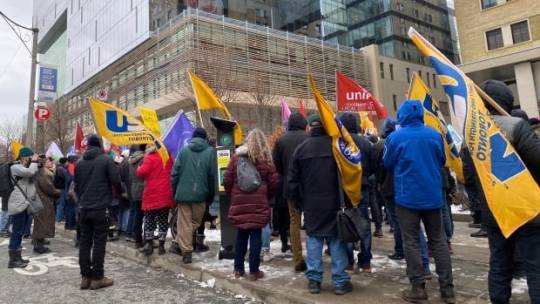
View On WordPress
0 notes
Photo
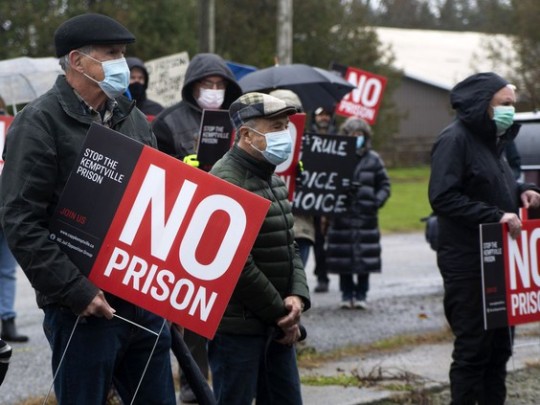
“KEMPTVILLE – In the lead-up to the provincial government’s online community engagement session on the proposed Eastern Ontario Correctional Complex, opponents of the proposed 235-bed prison rallied Saturday on the site selected for the prison.
“What do we want? Consultation! When do we want it? Now!” chanted the group of prison opponents who joined at the farmland of the Kemptville Campus just off Highway 416.
About 50 people attended the rally Saturday afternoon, many holding “No Prison!’ signs.
The virtual community engagement session on the proposed Eastern Ontario Correctional Complex in Kemptville will be held on Wednesday and is scheduled to start at 6:30 p.m.
“We felt it was important that, ahead of the engagement session, that we remind not only our fellow citizens but our local council and the provincial representatives that we have a message of our own,” said Colleen Lynas, a spokeswoman for the Coalition Against the Proposed Prison (CAPP).
Members of CAPP and the Jail Opposition Group (JOG) have long felt that the provincial government has been lacking transparency and meaningful consultation since the correctional complex project was announced without prior notice in the summer of last year.
Christopher Wilson, a resident of North Grenville who attended and spoke at the rally, said he was “disappointed” that the upcoming community engagement consultation wasn’t being conducted in person and that he wouldn’t have the opportunity to express his opinion directly to the stakeholders involved in the project.
Sarah Bowie, a Kemptville resident who also spoke at the protest, agreed with Wilson that it was disappointing that the consultation session was not in-person despite eased COVID-19 restrictions.
“We need more transparency, so that begs the question why is our engagement session online still?” said Bowie. “I guess they can’t press mute in person.”
Bowie said she has previously lived in prison towns where she saw and experienced the impacts it had on the small towns they once called home, including overrun social services, and she doesn’t want to see it happen to Kemptville.
“We are here today because we love North Grenville and we want to protect it from what we believe is a really bad idea,” added Bowie.
The virtual community consultation session will seek input from staff, community, Indigenous and justice sector partners throughout the design and development stages of the project.
As well, the community engagement will allow people to learn more and ask questions about the proposed prison set to be built on provincially owned land, stated the Ontario Ministry of the Solicitor General.
The prison opponents have been asking questions to the Leeds-Grenville-Thousand Islands and Rideau Lakes MPP, Steve Clark, Solicitor General Sylvia Jones and Premier Doug Ford and others for almost 15 months but have received almost nothing in return, said Kirk Albert, a spokesman for JOG, adding that there are also many other reasons why the groups are staying steadfast to their requests to the provincial government to hold robust consolation with the public and stakeholders.
The group wants the Ministry of the Solicitor General to release all documents on the site selection.
Shortly after the correctional complex announcement, there was a virtual community engagement consultation in November of last year.
Lynas said the previous consultation session a year ago was a disappointment and locals are concerned that there will be a lot of talking points and “a bit of smoke and mirrors but not a lot of substance” this time around.”
- Jessica Munro, “Jail opponents rally ahead of online meeting,” The Recorder And Times (Brockville). November 15, 2021.
#kemptville#rideau lakes#Jail Opposition Group#Coalition Against the Proposed Prison#Eastern Ontario Correctional Complex#ministry of community safety and correctional services#ford government#solicitor general of ontario#prison construction#prison expansion
0 notes
Text
was in a wal-mart in rural ontario recently, and i realized that, not only could you buy beer alongside hunting guns, in wal-mart, on a sunday, which all were not possible in this province the year i was born, but also the current ruling party was the main impediment to those things being illegal, and now it’s the main champion. the ontario conservatives were the very vanguard of rich people protestant morality in the public sphere. the statistical probabilty of protestants voted conservative and catholics voted liberal was such a truism that it was a shock when it dipped below 80% in 2006. in the 1950s, women couldn’t drink in bars without chaperones and religious groups went around harassing people who worked on sundays like saudi religious police. you could be jailed if you took a beer to the washroom until 2006. we were the last people in north america to get beer sales in sports stadiums, in 1982 (hilarious vids). indigenous people couldn’t buy booze until 1959, and the government reserved the right to inspect anybody’s home on a moment’s notice who bought booze and deny them that right until the 70s. even then, when government-run stores (which were the only place to buy booze until 2015) started introducing self-serve in the same years, it was common to hear denunciations of the evils of such practices on any given sunday. essentially, we were ruled by a protestant theocracy until the liberals were elected in 1985, the first non-conservative government in 42 years (and even then, it took until the social democratic ndp were in in 1992 to allow stores to open on sundays, even though a supreme court challenge on the basis of religious freedom had struck down the laws against that nationally 7 years before).
and then, despite those 42 years elected on the basis of the rich protestant vote, the tories abandoned that stance. first to neoliberalism, which gave mike harris 2 terms that absolutely shredded his coalition between the few remaining protestant moralists and the emerging pro-finance sphere, then to a series of failed runs at power. ernie eves and his effort to push a red tory welfarist agenda, john tory and his technocratic governance, tim hudak and his attempt to go full neoliberal, and patrick brown and his effort to unite religious conservatives across faiths. and then, doug ford went for the rural conservative vote, trying to align the religious conservatives who were ferociously terrified that their eight year olds would be taught about “gender identity” (indeed, the only difference between ford’s 2019 sex ed plan and the 2015 one is that such talk is delayed till grade 8), the rural austerians who hated the green energy push by the liberals which increased their electricity bills (which they paid for with federal agro subsidies anyways), and the anti-pc suburbanites who wanted someone who “says it like it is” (ie goes on racist rants), mostly while drunk at hockey games, which in turn requires booze to be readily available (in contrast to that horrible marijuana, which shouldn’t be in our community). and where are the rich ass protestants? they voted heavily for a gay man for mayor of toronto in 2010 and for a lesbian woman as premiere in 2018, which shows how protestant moralism 40 years later has diffused itself into a class of urbanites who prefer limited welfare and ruralites whose notion of morality is wholly about preventing anybody gender non-comforming from living in public view, which is why i can buy 12 blues and some ammo on a sunday afternoon at a wal-mart in 2019 (wal-mart entered canada by buying woolco in 1994).
120 notes
·
View notes
Link
A growing number of northern Ontario First Nations are raising concerns about Premier Doug Ford’s controversial economic recovery bill.
Bill 197, an omnibus piece of legislation that was passed last month without public consultation, included a rewrite of environmental rules that critics said weakened key protections. Both the Fort Albany and Attawapiskat First Nations denounced the law in late July.
In an open letter dated Aug. 7, the grand chief of the Mushkegowuk Council — which represents Fort Albany, Attawapiskat and five other nations near James Bay — called on Ford to honour Ontario’s treaty obligations to consult Indigenous people on matters affecting their traditional territories.
“There was no due process,” Grand Chief Jonathan Solomon said in a phone interview, referring to the Ford government.
“That’s quite important, because how they approached it was quite disturbing. They had no regard for consultation with the Indigenous First Nations.”
Ford has said Bill 197, which altered 20 pieces of existing legislation, is aimed at speeding up key infrastructure projects that the government says will help Ontario recover from the economic hit caused by COVID-19.
It was passed despite concerns from Ontario auditor general Bonnie Lysyk, who said the legislation was “not compliant” with Ontario’s Environmental Bill of Rights, which requires the government to consult the public on changes affecting the environment. A coalition of green non-profits is taking the government to court over the bill, asking Ontario’s Divisional Court to rule that it was “unlawful” for the province to pass it.
Lindsay Davidson, a spokesperson for the Ontario Ministry of the Environment, Conservation and Parks, said in a statement that Bill 197 included provisions that protect treaty rights. The new environmental assessment process also includes measures to require consultation with Indigenous communities, he said.
“We advised communities that there will be additional opportunities for consultation in the future and have asked for their thoughts on how we can work together so their interests and perspectives can help inform the modernized environmental assessment program,” he said.
“Now that the legislation is passed, the ministry will continue to consult with Indigenous communities as part of our efforts to modernize the environmental assessment program.”
Davidson also said the government held six webinars with First Nations to explain the ramifications of the bill. Five of them were held before the legislation passed, and the sixth was only held the day after because the community wasn’t able to participate on any other dates, Davidson added.
Nations in the Mushkegowuk Council are downstream of the Ring of Fire region. The Progressive Conservative government has announced intentions to develop the area into a mining hub, despite local opposition.
Ontario's Bill 197 included a major rewrite of environmental assessment rules, which critics said watered down key protections. A council of First Nations is now sounding alarms about the legislation.
Solomon said despite the measures aimed at preserving treaty rights, communities are concerned Bill 197 will be used to push through projects they have argued against. He called the bill a “major step back” that would undermine decades of environmental progress.
“Sadly, they’re using COVID-19 as a decoy to restart the economy at the cost of the environment, the waters, the animals, our livelihood,” Solomon said, adding that he understands the importance of the economy, but remains concerned about the impact on the environment.
“That's significant because we still practise our hunting and our trapping in our area. That’s a part of our subsistence, and being stewards of the land.”
Treaty obligations date back over 100 years
In his letter to Ford, Solomon outlined the obligations provincial and federal governments agreed to when Treaty 9 — which covers a wide section of land west of James Bay — was negotiated in 1905.
Ontario’s representative during those discussions, Daniel MacMartin, kept detailed notes in his personal diary of verbal promises made to the Mushkegowuk nations. Though the written agreement, outlined in a language First Nations leaders didn’t understand, outlined that the nations were ceding land and rights, the verbal promises recorded by MacMartin guaranteed the nations the right to use their homelands as they always had.
The nations agreed to the verbal promises, not the written ones, Solomon wrote in the letter.
“Premier, you can read those promises yourself, in the handwriting of the official Ontario government representative, who was writing down what he saw and heard,” the letter reads.
“Premier, we believe that promises made should be promises kept. We hope that you agree.”
Solomon also said Bill 197 has not changed the fact that the government must consult the Mushkegowuk nations about projects in their territories.
“If your government wishes to obtain Omushkego/Ininiwuk peoples’ consent to resource projects, forestry projects, mining projects, and other development in our Aski/lands, you will need to consult with us from the beginning,” he wrote.
“You will need to show how these projects respect the integrity of our environment. Further, you will need to demonstrate how these projects will benefit the Omushkego/Ininiwuk.”
Solomon said Ford has acknowledged the letter, and that he hopes the premier will be “genuine” in addressing council’s concerns. The council is looking at filing a court application of its own to contest Bill 197, he added.
“For me and other leaders this is illegal,” Solomon said in the interview. “It’s not right.”

3 notes
·
View notes
Text
Top Lawyers In Canada In 2020
Pascal Paradis
Executive director, Lawyers Without Borders Canada, Quebec City, Que. Also back for his second time around the Top 25, Paradis is an unstoppable force and a fervent advocate for human rights, particularly for women and kids. Thanks to Paradis' initiative, the Quebec bar joined LWBC to act as international counsel in favour of Raif Badawi, the Saudi blogger condemned to jail and flogging for his comments criticizing the regime. Since January 2015, Paradis and LWBC are leading a consortium of Canadian organizations working to get a wide-range five-year job to foster justice. They plan to execute means of balancing and prevention for women victims of sexual abuse and other individuals affected by the Malian armed battle. He also discusses several international conferences on human rights issues. What Republicans needed to say: He's left a very profitable position in a large federal law firm to go LWBC for quite a compact paycheque because he followed his heart and his enthusiasm.
Mark Tamminga
Partner, Gowling Lafleur Henderson LLP, Hamilton, Ont. Tamminga has devoted his career to automating lawful practices. His information technologies focus began in 1986 while he was a law student and has been given the job of systemizing the production environment for files. Since then, Tamminga's aptitude for legal technology has only grown with Gowlings LLP. Three decades back, he had been called Gowlings' Innovation Initiatives leader. He is in charge of automating the Gowlings recovery services practice. He has designed and built a number of additional training systems in the areas of debt collection, loan positioning, and civil litigation. His role has demanded re-thinking that the thornier aspects of big business operations: managing cultural change, inducing client-side believing, and building the compensation mechanics, which drive new behavior. What the panel had to say: Tamminga has shown real vision in tackling tough issues that many law firms aren't quite prepared to take on.
Allison Dellandrea
Crown counsel, Ministry of the Attorney General,Toronto, Ont. Dellandrea has been a key participant in advancing the understanding of crimes against children by law enforcement officers, fellow attorneys, and the judiciary. She had been included in a child sexual abuse case in March in which Ontario's former deputy education minister Ben Levin pleaded guilty to child pornography related fees. The fees included making composed child porn, counseling a person to commit a sexual assault, and possession of child porn. Dellandrea's role as a Crown includes function as instruction lead for Ontario's provincial strategy on Internet crimes against children. She's a worthy pioneer in this area within the justice department. What Republicans needed to say: Allison is a tireless resource and is the penultimate legal mind to get a prosecutorial place on all things related to child exploitation and sexual assault offences. For such a difficult subject that inherently entails quite taxing emotional and legal issues, Allison always has time to offer sound advice to other Crowns prosecuting these very difficult and sensitive offences. Her efforts have made a tangible difference in making our society safer.
Justice Ian Nordheimer
Judge, Ontario Supreme Court, Toronto, Ont. Nordheimer's name is becoming synonymous with class action suits mostly due to his ruling, which overturned Justice Edward Belobaba's decision in a high-profile situation on carriage in the Barrick Gold class action suit. Nordheimer granted the losing coalition of law firms leave to appeal Belobaba's decision in the Divisional Court. He's likely the most influential Superior Court degree judge in the country with a decade on the seat and produces perhaps the greatest number of thorough judgments each year in comparison to any trial level estimate. He's famous for his quick wit and sharp conclusions. In the last year, Nordheimer has made quite a splash in the legal community by upholding a professional field punishment for current LSUC bencher Joe Groia and releasing information that revealed Rob Ford was the topic of a police investigation.What the panel had to say: He is the kind of judge that must be on the Court of Appeal... or higher. A judge of absolute integrity.
Jean-Pierre Blais
Chairman, Canadian Radio-television and Telecommunications Commission, Ottawa-Gatineau Blais isn't afraid of criticism and is willing to go above and beyond in the name of customer rights. A new CRTC decision provides consumers more freedom to choose TV stations of their liking as part of their satellite and cable subscriptions regardless of bitter opposition from Canada's cable companies. Blais called out former Bell Media president Kevin Crull, without naming names, over reports Crull told CTV news personnel to not interview him after that decision. Crull ended up apologizing for interfering in the news gathering process and later resigned. From telemarketers to telcos, Blais always intends to encourage the rights and needs of customers. What Republicans needed to say: Reaching big shift with consumer-minded focus. About time!
1 note
·
View note
Text
Court Strikes Down Manitoba's 'Draconian' Wage Freeze Bill
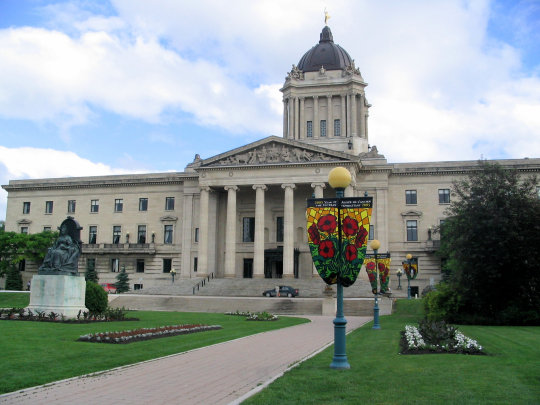
“In a major decision, a Manitoba judge threw out controversial legislation Thursday that sought to freeze the wages of more than 100,000 public sector workers. Manitoba Court of Queen's Bench Justice Joan McKelvey ruled against Bill 28, the legislation that was trying to force a two-year wage freeze on public sector unions. ‘I have concluded that the (Public Services Sustainability Act) operates as a draconian measure that has inhibited and dramatically reduced the unions' bargaining power and violates associational rights,’ McKelvey wrote.”
“The legislation, introduced in 2017, mandated a two-year wage freeze for government employees once their existing contracts expired. The freeze was followed by a 0.75 per cent pay increase in the third year and one per cent in the fourth. The bill was never proclaimed in law and thus never in effect — but public-sector unions say government negotiators acted as though it was. The law would have applied retroactively if it was proclaimed … Unions argued the legislation hung over collective bargaining negotiations for years. Some employee groups, including the Manitoba Nurses Union, have been working without a contract for years.”
CBC News, June 11, 2020: “Court Strikes Down Manitoba's 'Draconian' Wage Freeze Bill,” by Ian Froese
United Steelworkers Union, June 16, 2020: “The Jury Is In: Unconstitutional Attacks on Workers’ Rights Must End”
Canadian Law of Work Forum, June 14, 2020: “Manitoba Court Strikes Down Wage Freeze Law: Here’s the Decision,” by David Doorey
Manitoba Court of Queen’s Bench Decision (228 pages, PDF)
Legislative Assembly of Manitoba, Bill 28, Royal Assent June 2, 2017: The Public Services Sustainability Act
and in Ontario...
“Unions in Ontario are calling on the provincial government to make changes to Bill 124 after a Manitoba court deemed similar legislation as unconstitutional last week. Passed in November 2019, Ontario’s Protecting a Sustainable Public Sector for Future Generations Act of 2019 limits salary increases to one per cent per year during three-year moderation periods ‘to ensure that increases in public sector compensation reflect the fiscal situation of the province, are consistent with the principles of responsible fiscal management and protect the sustainability of public services.’”
“In March, a coalition of Ontario unions, coordinated by the Ontario Federation of Labour (OFL), filed a constitutional challenge to the bill, arguing that it violates collective bargaining rights enshrined in the freedom of association guarantee of the Canadian Charter of Rights and Freedoms. The coalition represented around 270,000 employees, according to OFL.”
Canadian HR Reporter, June 15, 2020: “Unions Want Ontario's Bill 124 Repealed After Manitoba Decision,” by Jim Wilson
Financial Post, June 12, 2020: “Victory in Manitoba Builds Opposition to Ford Conservative's Wage Restraint Legislation“
Unifor, June 12, 2020: “Court Victory in Manitoba Could Spell End for Ontario’s Bill 124″
Legislative Assembly of Ontario, Bill 124, Royal Assent November 7, 2019: Protecting a Sustainable Public Sector for Future Generations Act, 2019 (14 pages, PDF)
#manitoba#bill 28#labour law#manitoba court#ontario#bill 124#unions#ontario court#public sector#public sector union#collective bargaining#legislative assembly of ontario#legislative assembly of manitoba
1 note
·
View note
Text
Top Lawyers In Canada
Justice Beverley McLachlin
Chief justice, Supreme Court of Canada, Ottawa, Ont. A frequent member of the Top 25 list along with also the very best vote-getter in years ago, McLachlin continues to make waves, handing down two quite important decisions on aboriginal law. The 2014 Tsilhqot'at Nation v. British Columbia decision led by McLachlin is the earliest of its type in the history of British Columbia. Last year the Supreme Court of Canada granted announcement of aboriginal title to over 1,700 square kilometres of land. She's also responsible for upholding the decision of the Ontario Court of Appeal in Keewatin v. Ontario (Natural Resources) released in July 2014, she has overhauled what the Lamer court started and has left her mark in this area for decades to come. The chief justice continues to be a powerful proponent of greater justice for all Canadians. As her unbelievable amount of votes once more this year show, McLachlin is greatly admired not only for her rulings but her public support in favour of free speech, diversity, and comprehensive leadership. What voters had to say: An excellent judge that, time and time again, marries the legislation with common sense. Justifiably most respected legal mind in the country; outstanding integrity; reliable public servant; obviously guided by the law and also a strong ideology.
Allison Dellandrea
Crown counsel, Ministry of the Attorney General,Toronto, Ont. Dellandrea was a key participant in advancing the understanding of crimes against children by law enforcement officers, fellow attorneys, and the judiciary. She was involved in a child sexual abuse case in March in which Ontario's former deputy education minister Ben Levin pleaded guilty to child pornography related fees. The fees included making composed child pornography, counseling a person to commit a sexual assault, and possession of child pornography. Dellandrea's function for a Crown includes being the instruction lead for Ontario's provincial plan on Internet crimes against children. She's a worthy pioneer in this area within the justice section. What Republicans needed to say: Allison is a tireless resource and is the penultimate legal mind to get a prosecutorial position on all things associated with child exploitation and sexual assault offences. For this challenging subject that inherently entails quite taxing emotional and legal issues, Allison always has time to offer sound guidance to other Crowns prosecuting these very tough and sensitive offences. Her efforts have made a concrete difference in making our society safer.
Justice Ian Nordheimer
Judge, Ontario Supreme Court, Toronto, Ont. Nordheimer's name is becoming synonymous with class action suits largely due to his ruling, which overturned Justice Edward Belobaba's decision in a high-profile situation on carriage in the Barrick Gold class action suit. Nordheimer granted the losing coalition of law firms leave to appeal Belobaba's decision in the Divisional Court. He's probably the most influential Superior Court level judge in the nation with a decade on the seat and produces perhaps the best number of thorough judgments each year compared to any trial level estimate. He's famous for his quick wit and sharp conclusions. In the past year, Nordheimer has made a significant splash from the legal community by imitating a professional field punishment for current LSUC bencher Joe Groia and releasing information that demonstrated Rob Ford was the subject of a police investigation.What the panel had to say: He is the sort of judge who must be on the Court of Appeal... or greater. A judge of absolute integrity.
Frank Iacobucci
Senior counselor, Torys LLP, Toronto, Ont. This heated justice has set the bar for police treatment of the mentally ill. His 2014 landmark report summarized 84 sound ways of helping to prevent shooting of mentally ill people by the Toronto Police. The execution of the report would go a long way toward avoiding disastrous confrontations between police and emotionally disturbed individuals. Some of the recommendations include using body-worn cameras and enhanced use of tasers. The report is a strong message that the status quo is no longer okay. As a Torys counselor, Iacobucci is used to advising government and company on important legal and policy issues. What Republicans needed to say: Has anybody really done more? and Energetic, not stops.
Mark Tamminga
Partner, Gowling Lafleur Henderson LLP, Hamilton, Ont. Tamminga has committed his career to automating legal practices. His information technology focus began in 1986 while he was still a law student and has been given the job of systemizing the manufacturing environment for mortgage files. Ever since then, Tamminga's capability for legal technology has only grown with Gowlings LLP. Three years back, he had been called Gowlings' Innovation Initiatives leader. He's in charge of automating the Gowlings recovery solutions clinic. He has designed and built a number of further practice systems in the areas of debt collection, loan placement, and civil litigation. His role has demanded re-thinking that the thornier aspects of big firm operations: managing cultural change, inducing client-side believing, and building the reimbursement mechanics, which drive new behaviour. Exactly what the panel had to say: Tamminga has shown actual vision in handling tough issues that lots of law firms aren't quite ready to take on.
1 note
·
View note
Link
A PC political staffer has resigned over the Ford government’s autism overhaul, calling the changes a “huge disappointment” and saying his advice against age-based funding was not heeded.
“In light of today’s announcement, I told my minister I did not feel I could continue in my role as legislative assistant,” said Bruce McIntosh, who joined PC MPP Amy Fee’s political staff when the Ford government was elected last spring.
McIntosh, the father of two teenagers with autism, is the former president of the Ontario Autism Coalition, a parent advocacy group that has been pushing for more support for families.
In 2016, Patrick Brown said during question period that Bruce McIntosh is a “tireless advocate” and that the Liberals should let him speak freely and listen to his advice.
17 notes
·
View notes
Text
People across Ontario are casting ballots in a “community-run referendum” that is weighing a heavy question on the privatization of health care.
In March, the Ford government passed a bill that would allow more private clinics to offer some publicly funded surgeries to help reduce the surgery backlog that built up during the COVID-19 pandemic.
To protest that move, the Ontario Health Coalition is turning to the public to ask their opinion on the issue.
Volunteers are set up all over Kingston, and across the province, speaking with the public about this issue and encouraging people to cast their vote.
“The Ontario Health Coalition has set up this referendum to stop privatization of Ontario’s hospitals by the Ford government. They’ve set up almost 1,000 polling stations across Ontario,” volunteer Beth Wylie told Global News. [...]
Continue Reading.
Tagging: @politicsofcanada
90 notes
·
View notes
Text
"Please can we not make her mayor?"
I woke up today to this fascinating question regarding Cllr. Ana Bailão’s votes to uphold systemic oppression within the Toronto Police. “Please can we not make her mayor?”
It was a deceptively complex question that got me thinking of some of the fundamentals of activism, social change and politics, that I wanted to unpack this question bit by bit.
I’ve cut it into five sections: PLEASE, CAN, WE, NOT MAKE HER, MAYOR.
///
1. PLEASE
I assume this softens the meaning of the phrase - “I want her out of politics” is pretty harsh – especially in the context of a man publicly critiquing a woman. Yet it shows us something important – we are implying we need permission to participate in politics.
Why are we asking for permission? And to whom is this appeal directed? Last time I checked, I don’t need permission to do most things in life, including participating in the political process. Our US-based friends did not ask for permission when they recently revolted against their governments; they did it even though they faced police brutality, neo-Nazi paramilitaries, psychological warfare, a global pandemic and more.
The “please” comes out of the respectability politics that makes “Ontario” as a political entity so curious. “Please don’t gut our healthcare!” is not coming from a position of strength. (Anyway, it’s much easier for progressives to walk back overzealousness in the name of justice than it is for people to walk back bigotry.)
To best challenge power, we must never apologize for having ambitious convictions. We need to champion big ideas, even if they’re ahead of the curve. Two months ago, police reform would have been considered impossible in America. And they were right, it was impossible...under the existing model. So they changed the model.
Change – especially lasting change – comes from the grassroots, so while it’s not a bad thing to support progressive political candidates, parties and organizations, it is *significantly* more important to support issues-based activists and organizations (i.e. if you give $10 monthly to the NDP, why not also give $10 to your favourite advocacy group?). Issues-based groups are formed to challenge one specific cog of power at a time and can therefore deliver deep, fundamental and long-lasting impacts. (Plus…this is a great way for potential candidates to gain some experience; get those ppl knocking on doors now and they’ll do much better in 2022.)
2. CAN
If we are asking “do we, as a community, have the capacity to elect someone better?” The answer to this is yes, but if we’re instead asking “will someone within the existing structure please FINALLY get off their ass and challenge her?” then we might ask ourselves why this hasn’t already happened. The civic left has largely allowed Cllr. Bailão (and, to a lesser extent, Mayor Wonderbread, who is merely a pathetic, respectable version of Rob Ford) to go unchallenged because she’s been deemed impossible to beat, but by not challenging her, the civic left has allowed her career to continue essentially unfettered because they don’t want to spend resources on a race they’re unlikely to win. If only there were some other downtown districts where a new, young generation of activists can start to build their careers…except the seats available are full with straight white boy progressives.
Why does the civic left protect Gord Perks, Joe Cressy and Mike Layton? Like…honestly…I just don't see what the big deal about Joe Cressy is. He bumped Ausma Malik out of the 2018 election instead of doing the right thing and making way for a supremely talented racialized woman like I'd hope someone committed to true justice would. There is even a movement in the democratic party to ask white men to not run in safe seats. [This paragraph and the next have been edited for tone, thank you to Colin Burns for encouraging me to rethink my words and my misdirected anger, my frustration naturally lies with Cllr. Bailāo's behaviour.]
Gord Perks verged into alt-left territory last year as a free-speech absolutist and consequently an apologist for bigotry when he should have defended trans folk. He even shared his disappointing thoughts publicly (yup, he did, they’re still up, don’t @ me on this one, you’ll regret it: http://gordperks.ca/toronto-public-library-chief-librarians-decision/) so considering who he seems to be, we can do better after 14 years? (TL;DR – there’s need for renewal in a lot of parts of our movements, and the labour movement is no exception.)
Mike Layton is a lovely man with his heart in the right place. I’ve volunteered for him and would gladly do it again. It therefore pains me to recognize that his last name is more than a name. I’m happy for everything he (and his team) has contributed in a rapidly changing district. My concern is that lefties can’t afford to support dynasties in the same way that liberals and conservatives can, especially in downtown districts where our odds of winning are good and where we ought to be supporting talented Black, Trans, Indigenous, disAbled and economically-disadvantaged candidates that are already on the front lines of social change. (This list is illustrative, not exhaustive.) By the time of the next election, Mike Layton will have been there for 12 years. Perhaps it’s time for him to open an opportunity for others.
3. WE
Who is “we”? Is it people in this district? Is it people in Toronto? Is it progressives? Whoever can identify this “we” and mobilize them will have the best shot of defeating her. This is the “coalition” people describe as needed to win election. Of course, this includes whoever’s running for office and their team. That organizing work needs to start right now if there’s going to be any chance of a lefty winning this seat in 2022. (If you think she isn’t already considering her council seat successor, remember that her old boss was Mario Silva, who was *coincidentally* Davenport’s City Councillor and MP for a combined 16 years.)
4. NOT MAKE HER
This is maybe the biggest hurdle to get over since “NOT ANA BAILAO” is not an option on the ballot. Considering there are no formal (lol) parties or slates on council, her name recognition is her biggest electoral asset, so a keep-it-safe campaign won’t work. Plus her public image is fairly non-toxic, so as pissed off as we all are, most people won’t be swayed by a STOP BAILAO campaign from the left (the trope of the conservative woman can be very powerful – thanks Maggie – so expect her campaign to lean pretty typically right).
When we say “Cllr. Bailão should not be Mayor” we rob ourselves of the ability to say “I think this person would make a great mayor” or “these are the some of the values I want in a mayor.” – and I don’t mean just of the City Council types. (At this point, Josh Marlow is the other councilor to watch.)
I hate hearing “why can’t we have AOC or Jacinta Arden or Anne Hidalgo or Ilhan Omar?” They didn’t come out of thin air. We already have those people here, we just haven’t elevated them to where they can make a difference and this is why. (Also, lefties, let’s seriously push for term limits and ranked ballots…especially the term limits, most ppl out there love the idea, it costs zero dollars and ensures districts have a healthy amount of turnover.)
5. MAYOR
Toronto City Council is a “weak mayor” system. The Mayor need council approval for pretty much everything important. The Mayor will find success or failure on how well he can build a team of reliable allies on council. It’s something thing Mayor Wonderbread does too well: his allies don’t offer a lot of different views. A hypothetical Mayor Bailão would probably do similar.
So then how rigid should a politician be? Are they supposed to be trustees, where we trust them to do what’s best for us and we have a check-in every 4 years? Or are they supposed to be conduits of public opinion with little regard for context? Or is a councillor meant to reflect the demographics of their district, even though they can only truly embody one set of lived experiences as an individual? Or perhaps, in the case of Cllr. Bailão, someone not dedicated to steering the ship but merely running the engine, not caring where it sails even though we've seen icebergs on the horizon? We’ve grown up in a SimCity generation where we think the mayor can make whatever they want happen. As great as that might sound sometimes, in a democracy, accountability matters. But it must come with a recognition that SimCity mayors don't fear the wrath of the voters.
///
I want to recognize that a 10% reallocation is fucking pathetic and still Toronto council couldn’t do it…but at least we know where we stand, and with whom.
We often look at politics as a sport or a soap opera, and it feels great when your team scores points or your favourite character delivers a knockout performance. Even I was like “dang girl” when Nancy Pelosi defiantly ripped up the President’s speech. I was also touched by Jagmeet Singh’s touching display of emotion the day after he was ejected from the House of Commons for calling out bigotry. But that’s not politics, that’s a long running TV drama series, so as disappointed as I am in what happened, I’m not gonna yell at her in the street because White Man Raging is not a great look these days…or ever.
So let’s not make this about my neighbour, Cllr. Ana Bailão. Let’s make it about the system of oppression she has willingly chosen to uphold and tearing that motherfucker down piece by piece.
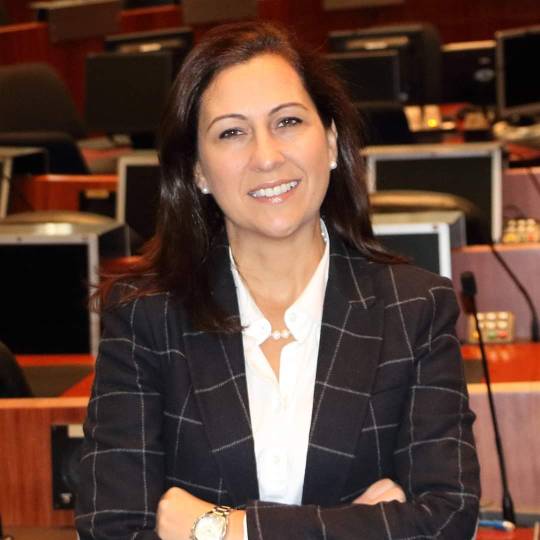
0 notes
Photo
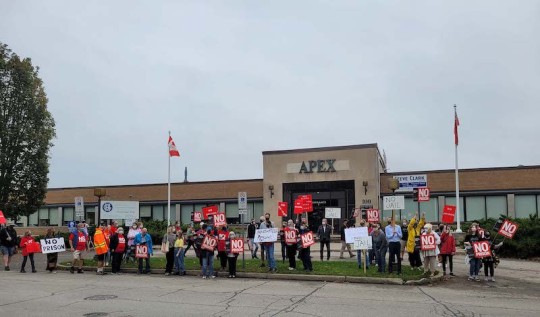
“A significant protest against the proposed Kemptville prison took place outside Steve Clark’s constituency office in Brockville last week. Around 60 people from North Grenville brought their signs, t-shirts, and concerns home to the local MPP and Minister of Municipal Affairs and Housing.
The Coalition Against the Proposed Prison (CAPP) and the Jail Opposition Group (JOG) arranged the protest, and they were joined by concerned citizens, including Liberal candidate for North Grenville, Josh Bennett and members of the media.
The protest was moderated by Colleen Lynas of CAPP who said a few words to the crowd, as did Kirk Albert of JOG. The protesters marched from a nearby park to Mr. Clark’s office, chanting and calling on Steve to come out and talk to them. Although there were reports that he was in the office, and had briefly watched the group gather at the park, he did not make an appearance while the marchers were in front of his office.
Kirk Albert from JOG explains a few of the reasons for staging the event:
“We want to remind MPP Clark that the residents of Kemptville and the surrounding Municipality of North Grenville have a voice, and that our collective voice has been communicating legitimate concerns about all aspects of this proposed prison for over a year now which he has distanced himself from. We want to remind him and the Ford Government that, as constituents, we are the people who will be directly impacted by this plan, and that continuing to by-pass public consultation and public input is not only dismissive and undemocratic, it is also not what we expect from our own MPP and other elected officials. It is time for the government to admit that mistakes have been made. They need to reconsider their proposed plan rather than heedlessly continuing to impose the prison on a rural town where the government’s own documents indicate that the location doesn’t meet their requirements.”
There is a great deal of anger and disillusionment surrounding Steve Clark, owing to his role in bringing the proposed prison to North Grenville, and specifically with what are seen as misleading statements made by the Ford government about the economic benefits that would come with the prison.
“After the announcement, we looked into these claims and consulted leading prison experts”, explains Victor Lachance of CAPP. “The touted economic benefits for our community have been proven false and all signs point to an increase in property taxes, and undue strain on our local infrastructure, healthcare, and other resources. Reasons for opposition are wide-ranging and include not only local concerns, but broader economic, social justice and environmental issues, and disbelief in the undemocratic and arrogant behaviour of office holders in Queen’s Park including our MPP Steve Clark.”
A notice from Minister Clark is published in this issue of the Times announcing what he terms a “public engagement on the design of the new facility in Kemptville” to be held in November.”
- David Shanahan.”Anti-prison protest comes to Steve Clark,” The North Grenville Times. October 20, 2021
#kemptville#brockville#north grenville#ford government#member of provincial parliament#Coalition Against the Proposed Prison#ministry of community safety and correctional services#ontario prisons#prison expansion#prison construction
0 notes
Text
FORD TORIES TAKE ONTARIO: TIME TO FIGHT BACK!
By Dave McKee
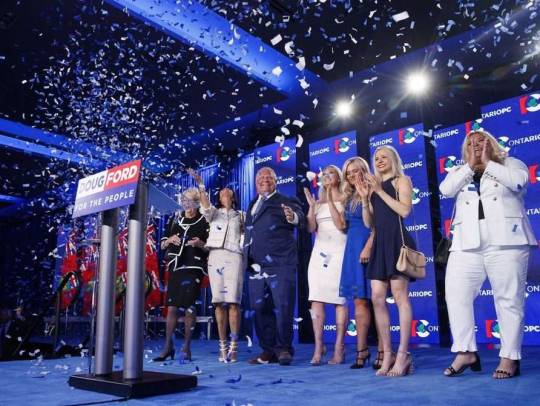
Ontario PC leader Doug Ford stands on stage in Toronto with his family as confetti falls after winning a majority government in the Ontario Provincial election. [The Canadian Press/Mark Blinch]
The victory of Doug Ford’s Conservatives in Ontario is one example among several in Canada, of hard-right parties making electoral gains that immediately threaten the incomes, working and living conditions, and social and economic rights of millions of working people. Ford joins with governments in New Brunswick, Quebec, Manitoba, Saskatchewan and, perhaps soon, Alberta, in implementing policies that aggressively clear a social, economic and political path for increased corporate profit and power.
Add to this the resurgence of far-right and reactionary parties globally, plus the real possibility of a Conservative victory in next year’s federal election, and we have the makings of a perfect storm in which the working class, people and environment will face a brutal onslaught with devastating consequences. On the other hand, we also have a wide-open terrain for building a strong fightback that can confront and defeat these forces of neoliberalism and austerity. Within this resistance, we find the fertile ground for growing the struggle against capitalism itself and for socialism.
One of the challenges we face is in identifying and organizing around the key tasks that are necessary to build this fightback. Without question, the working class and progressive forces in each area and sector face particular conditions that shape how their struggle develops locally. Gathering our insights together and analyzing them from a scientific point of view can be useful for formulating a generalized approach across Canada.
In Ontario, the government and capital have moved quickly to implement a hard-right agenda but the resistance has been slow to develop. There continue to be impressive moments of spontaneous struggle, evidence of a high degree of opposition and capacity to mobilize around that. However, there have been very few steps taken to develop the unity, organization and militancy necessary to confront and defeat Ford’s government and the neoliberal austerity agenda behind it.
Communists have been working with the non-sectarian left to identify some of the key tasks for building an escalating resistance to the Ford government. In part, this work is the product of analyzing the balance of forces involved in the provincial election campaign, the fightback as it has emerged to date, and an evaluation of the provincial struggles against the Mike Harris Tories in Ontario in the late 1990s, and against the Bill Bennett Social Credit government in British Columbia in 1983.

Premier Doug Ford posing for a photo with white supremacist Faith Goldy (2018) [Twitter]
1. We need to expose the class nature of these governments
The dominant message in the Ontario election campaign was that it was a referendum on the McGuinty-Wynne Liberals, who had been in government for 15 years. This narrative focused on voter fatigue and leadership personalities, and projected the conclusion that there simply needed to be a change in ruling party – the politics, or the shape and content of that change, was unimportant. Both the NDP and, in particular, the Conservatives parroted this narrative of de-politicized change, which had been promoted for months ahead of the campaign by the corporate media. In the process, the Conservatives’ hard-right message was often treated as mainstream – Doug Ford’s public admiration of Donald Trump or his organizational connections with far-right and reactionary forces were ignored in the media. Virtually all mainstream discourse overlooked the fact that the Conservatives’ policies (they only released a platform in the dying days of the campaign) were copied nearly verbatim from the election document of Ontario Chamber of Commerce. The result was an election debate that was almost devoid of any reference to the class nature of the issues at stake.
This is a problem that has now been projected into the post-election discourse.
There has been plenty of criticism of Ford’s rapid-fire attacks on public services and public sector workers, education, health, Indigenous and racialized people, the poor, women and LGBTQ persons, the environment, and local democracy. But overwhelmingly, the depth of that critique has been utterly insufficient, with most of it focusing on Ford as a mean-spirited buffoon who is guided by his personal scores to settle. Building an effective fight against the Conservative government involves recognizing and understanding corporate interests that are driving most of their hard-right policies. One of our first tasks is exposing these interests.
Generally, people understand the link between lower wages or privatization and corporate profit. However, many of Ford’s attacks have come in the form of administrative changes, and here the link is less obvious but just as real.
One example of how this works is the changes to local democracy that were introduced just prior to the municipal elections in October. The legislation canceled elections for the heads of council in the regional municipalities of Muskoka, Peel, York and Niagara, and replaced them with appointees from the council. The heads of council are the Chief Executive Officers of huge and strategically important areas within the “Greater Golden Horseshoe” region (GGH), which generates two-thirds of Ontario’s and one-fifth of Canada’s Gross Domestic Product. The Muskoka Region is especially noteworthy, as it is a gateway for infrastructure relating to the enormous mineral wealth in Northern Ontario’s Ring of Fire. By replacing the elected heads for these regional municipalities by appointees, Ford is accelerating corporate access and influence over the bulk of the province’s infrastructure, services, industry, and resources.
The same legislation cut Toronto’s elected council in half. One immediate and dramatic result is that councillors have no time or energy to properly monitor, let alone expose or challenge, a staff-driven city government that is enormously vulnerable to the pressures of both corporate lobbyists and provincial political pressure.
The response from people in Toronto to the cuts in councillors was swift and dramatic – protesters filled Nathan Phillips Square and the gallery at Queen’s Park, where several people were arrested for disrupting the legislature. Unfortunately, though, virtually none of the political discourse noted the way in which the legislation served the interests of corporate developers and other sections of capital. Instead, the message that emerged from the protests was that Ford was settling scores with his political enemies at Toronto City Hall. Such a narrative is not only incorrect, it actively extinguishes the development of a broad resistance, by obscuring the broad nature of Ford’s assault and guiding people into individual “fightback silos” that are only active for a brief moment, around highly localized issues.
Exposing the class nature of the government’s attacks brings their full scope into focus and helps build strong solidarity between different local or sectoral struggles.

Days of Action demonstration at Queen's Park, Toronto. (October 1996) [Public Domain]
2. We need to call for a united, "all-labour" resistance
In British Columbia in 1983, Communists and progressives insisted that the coalition against Bennett’s SoCreds include all trade unions, whether or not they were affiliated with the BC Federation of Labour. Operation Solidarity, as the movement became known, was an historic moment in which BC Fed affiliates and unaffiliated independent unions set aside their bitter rivalry and mobilized alongside one another against a common enemy.
The current effort to build resistance to the Ford government is complicated by the division within the labour movement, in which Unifor has departed from the Canadian Labour Congress and its provincial affiliates, who have in turn demanded that local labour councils exclude Unifor members. So, at precisely the moment when labour unity is most needed, it is undermined by the actions of the leadership on both sides of this split. Trade unions in Ontario need to take a lesson from 1983, to set aside this rivalry and work in solidarity against the provincial government.
But the working class is more than just the trade union movement, so an “all-in” struggle against Ford needs to engage the full range of labour allies. This includes anti-poverty coalitions, housing and tenants organizations, health care activists, Indigenous and racialized groups, youth and students movements, women’s and LGBTQ groups, and others. Many of these sectors of the working class will face the brunt of Ford’s immediate assault. Actively and genuinely engaging them in a structured resistance ensures an organized reflection of the full breadth of the working class, and the scope of the issues that the working class faces under capitalism.
An “all-labour” resistance does not, in and of itself, guarantee a successful struggle, but excluding sections of the working class from the struggle will undoubtedly guarantee its failure.
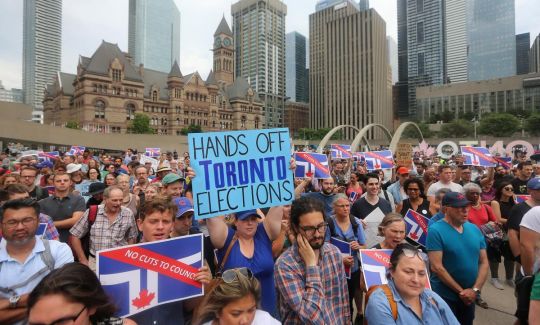
Hundreds protest against Ford’s plan to cut the size of Toronto City Council down to 25 seats before the fall municipal election. (July 2018) [Toronto Star/Steve Russell]
3. We need to build a local base of vibrant fightback committees
Well before the election, there was ample evidence of an increasing mood to fight against austerity and neoliberalism. Among union members and local labour leaders, this militancy was present in both the public sector – the Ontario Public Service Employees Union college faculty strike, the Canadian Union of Public Employees’ fights at public libraries and Children’s Aid Societies across the province, and the Canadian Union of Postal Workers’ refusal to distribute fascist material through the postal service – and the private sector – the United Steel Workers’ ongoing struggle against the liquidation of Canada’s steel industry, UNITE-HERE’s strikes for a $15 minimum wage at campus food services, and Unifor’s strike at CAMI Automotive to protect jobs and wages in the face of NAFTA. This sharpened sense of struggle has continued this year with the CUPE strikes at Carleton and York Universities, the latter being the longest university strike in Canadian history, the defiance of teachers’ union who refuse to stop teaching a progressive sex education curriculum, the Unifor workers who blockaded the Goderich salt mine against scabs during their 11-week strike at Compass Minerals, and two strikes by workers in the health care sector in Thunder Bay.
Outside of trade union disputes, this rising militancy is on display in the Women's March in January, the September 21 walkout by 40,000 high school students from 160 schools across Ontario against Ford’s attack on sex education, the October 15 Day of Action in defence of Bill 148 (the 2017 Fair Workplaces, Better Jobs Act), which included rallies in 50 communities across the province, and the October 23 provincial rally for health care.
Despite the lack of a lead from the OFL and many provincial labour affiliates, the working class is moving into action – increasingly, albeit unevenly, defensive struggles are shifting to the offensive and local disputes are connecting with political struggles. Where this is happening is at the local level – within workplaces, communities and schools. In some instances, these grassroots efforts have pulled the provincial leadership into action, demonstrating the capacity of class struggle positions to win over the majority.
One of the pillars of the 1990s fightback against then Premier Mike Harris was the provincial network of local social justice coalitions. These groups worked with local labour organizations to broaden the reach of anti-Harris mobilizing. Very few of these coalitions exist now, but the elements of vibrant, grassroots anti-Ford committees exist in the spontaneous and local mobilizations that have already occurred.
A key task is to build these local committees and connect them to one another in a provincial network that projects the militancy, audacity and tactical creativity needed to unite and engage the entire labour movement in a militant and dynamic class struggle.
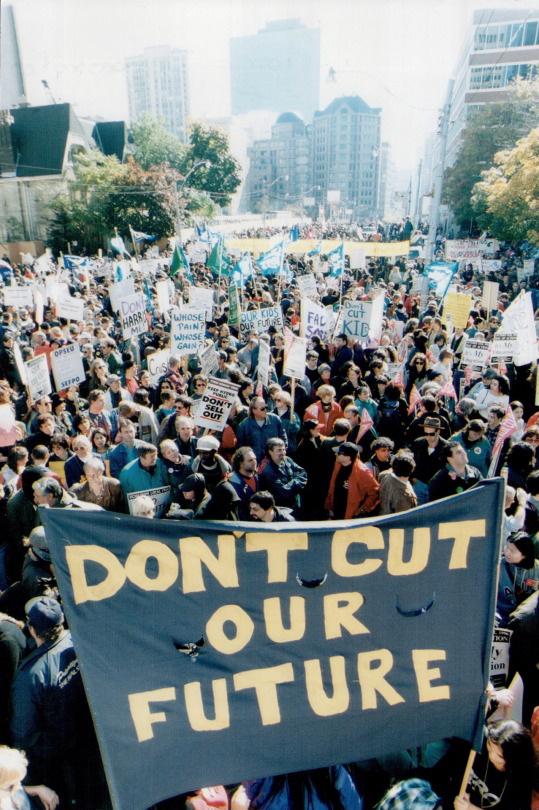
OPPOSITE: Days of Action demonstration, Toronto. (1996) [Toronto Star/Andrew Stawicki]
4. We need to project a program of working class demands
Without a clear set of political, economic and social demands, a resistance movement will not have the glue needed to hold itself together over the course of a prolonged struggle. As impressive as they were, the Days of Action mobilizations in the 1990s never articulated a clear set of political goals. There were voices from the left who promoted specific demands at the different actions, but there were also Liberal Party forces whose message was that the government’s cuts were “too much, too fast.” The NDP and organizations tied to it tended to engage with the resistance very cautiously and only insofar as it helped to raise the profile of their candidates in preparation for the next provincial election. The overall tone of the movement never moved beyond being a protest against the Harris agenda, which itself was differently defined by various groups within the coalition.
The resulting lack of political focus – or focus on program – made it that much easier for the Days of Action to be stopped – just as the movement was building to a province-wide shut-down – by an OFL leadership who wanted instead to rally union forces towards the NDP election campaign.
A similar situation exists now. At its convention in November 2017, the OFL adopted a tactic of uncritical and unconditional support for the NDP in the provincial election. While that party’s platform was an improvement on their disastrous 2014 version, it remained tepid and business-friendly. The majority of the trade union movement leadership, however, continually presented it as the pinnacle of working class demands, and some actively characterized as unrealistic and irresponsible genuinely progressive polices that emerged from voices beyond the NDP. A significant minority of the trade union leadership, including Unifor and some teachers’ unions, advocated strategic voting – supporting the individual Liberal or NDP candidate who stood the best chance of defeating the Conservative in a specific riding.
Both of these strategies – blanket support for the NDP and strategic voting – compel the labour movement generally to fail in its responsibility to project an independent working class voice in the election campaign. The practice of directing all of labour's political work outside of itself is a weakness that contributed to the pervasiveness of a de-politicized call for change, and that finds its echo in the weakness and tentativeness of the post-election fightback.
The Communist campaign during the 2018 Ontario provincial election included two slogans: “Demand a People's Alternative” and “Ignite the Movement for Socialism.” The two messages are related, and provide a path to one another, so long as they are projected in way that is scientific, materialist, and non-sectarian. To demand alternative policies and programs that truly reflect people's needs is to counter-pose such policies to existing ones, exposing the class character of the latter and drawing people's consciousness increasingly toward the need to change the existing capitalist system. Similarly, building a movement for revolutionary change involves engaging in the immediate struggles of the working class to win and defend gains, and working to weld socialist consciousness on to that concrete experience.
Communists have a longstanding theoretical grasp of the relationship between reform and revolution. How we put this understanding into action has a huge impact on our ability to build the forces for socialism. As the CPC's Ontario election slogans suggest, meeting this challenge requires a unified approach based on two complementary tasks: (1) we must cut through and isolate political policies and movements that are opportunist or reformist and replace them with an analysis that understands the class nature and role of the state and the necessity of mass action (and, ultimately, revolution), and (2) we need to reject sectarianism and forge the broadest possible unity in action to win, defend and extend immediate reforms that benefit the working class and the people generally.
A comprehensive program based on working class demands, which combines action on immediate issues with more far-reaching change, is a crucial element in uniting and sustaining a strong resistance to neoliberal austerity.

A scene from the Hamilton Days of Action. A crowd marches through downtown to Copps Coliseum. (February, 1996) ["Celebration of Resistance"/Vincenzo Pietropaolo]
5. We need to built it
It should go without saying, but in an age of “clicktivism” and self-selecting social media circles we need to be reminded that movements have to be built and organized in the concrete world. Wishing something into existence by setting up a Facebook event page does not make it so. Even if the trade union leadership were to sign on to an action plan that included advancing labour’s independent political voice, with the goal of bringing down the Ford government, nothing of substance would be accomplished without the daily door-to-door and face-to-face work of pulling together and mobilizing a base.
In the late 1990s, the speed and breadth of the Conservative government’s attacks led to spontaneous and mass mobilization. This spontaneity was a key factor in rapidly building up fightback structures that organized the single-day general strikes and protests of the Days of Action. The important lesson here is that spontaneous resistance and opposition needs to become organized if it is to be sustained and developed.
Clearly, the actions of the Ford government are also provoking a spontaneous mass response. What is needed now is still the same – organization and leadership. Writing in 1901, in a moment of very sharp and widespread spontaneous struggle leading up to the revolution of 1905, Lenin observed:
“This struggle must be organised, according to ‘all the rules of the art’, by people who are professionally engaged in revolutionary activity. The fact that the masses are spontaneously being drawn into the movement does not make the organisation of this struggle less necessary. On the contrary, it makes it more necessary.”
What was true in 1901 remains true today.
Dave McKee is the Ontario leader of the Communist Party.
0 notes
Text
Quebec vote shows it's no longer 'the economy, stupid': Don Pittis
New Post has been published on https://funnythingshere.xyz/quebec-vote-shows-its-no-longer-the-economy-stupid-don-pittis/
Quebec vote shows it's no longer 'the economy, stupid': Don Pittis

In the vote that gave us the original Free Trade Agreement in 1988, Conservative prime minister Brian Mulroney won the election with the slogan “Jobs, jobs, jobs.”
Only four years later, Bill Clinton crushed his incumbent opponent, Republican President George H.W. Bush, with the slogan “It’s the economy, stupid.”
But if that strategy worked three decades ago, it doesn’t seem to be working now. In fact, there is increasing evidence that people frequently end up voting against their own economic interests.
The Quebec economy, booming in a way it has not for years, was simply not enough for voters to re-elect the Liberal government of Philippe Couillard. And Quebec is just a single example. There is evidence the same thing is happening around the world.
Voting against yourself
Arguably, the U.S. economy under former president Barack Obama’s Democrats had been recovering sharply before they were ousted by the Republicans. Next door to Quebec, Ontario’s economy was also strong when the Liberals got the boot from Doug Ford’s Tories.
Britain’s Brexit vote to leave the the European Union has already created the contraction predicted by many experts, including Bank of England governor Mark Carney, who warned it would lead to inflation and unemployment. Large numbers of poor people in the U.S. continue to support President Donald Trump even though his tax cuts for the rich did nothing for them.
“This disconnect between personal financial interest and partisan lean may be partly explained by the fact that increasingly, other things matter more than money when it comes to political affiliation,” said The Economist when it tried to explain why so many in the U.S. vote against their own economic best interests.

During the election, Liberal Leader Philippe Couillard visits a ventilation shop in Quebec City. The Liberals ran on their economic success, and they lost. (Jacques Boissinot/Canadian Press)
Data from the Pew Research Center showed that slightly more poor people supported Trump than people with incomes over $150,000 US who are the beneficiaries of his tax cuts. Other data showed that people most in need of social assistance and medicare, the poorer and older, were more likely to support the Republicans.
In the U.K. something similar happened as wealthy urban elites, who live where immigrants are plentiful, favoured remaining within the European Union, whereas poorer rural and small-town voters, where the number of immigrants is small, supported Brexit at least partly on the grounds of reducing immigration.
It is almost impossible to be sure exactly why Quebecers voted the way they did, says Ming Li, an economist at Montreal’s Concordia University who has studied the psychology of voting.
Irrational voting
For one thing, a vote for the winning Coalition Avenir Québec was by no means a vote against the economy. The CAQ platform, while untried, is full of things the party expects to make people better off, from tax cuts to better pre-school.
Li also says strategic voting may have come into play, as longtime Parti Québécois supporters looked for someplace to park their vote as that party sagged. As in Ontario, the Liberals had been in for a long time and many people wanted a change.
It also may be that voters did not give Couillard credit for the strong economy, and instead remembered with bitterness his health-care cuts and increases in the cost of daycare.
An expert in, among other things, economic game theory, Li has tried to decipher some of the complex set of reasons that voters use to make their decisions. And according to his research, people may not vote for the reasons you think. In other words, people do not add up all their economic interests and see which party will fulfil them best.
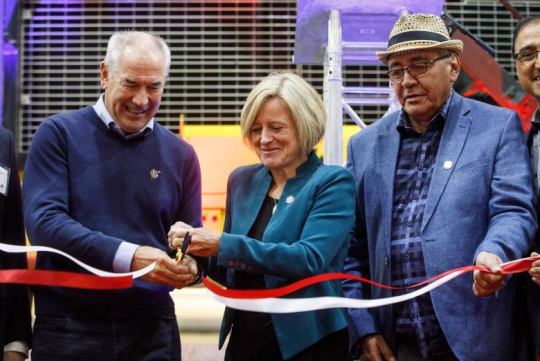
Alberta Premier Rachel Notley cuts a ribbon at the grand opening of the Suncor Fort Hills mine last month. But at election time in 2019 Notley will need more than a strong economy. (Jason Franson/Canadian Press)
“There is definitely the theory that voters are not necessarily rational,” says Li.
Instead, election psychology may be an expression of dissatisfaction with the government you have lived with for several years. The more grievances you have, over things like immigration, or taxes, or health care, the more likely you are willing to ignore the good things the government has been doing for you.
“The governing party might sell how good the economy is,” says Li, “but then the challenger can always find something (voters) are not satisfied with.”
And that may be a lesson for coming elections, including the one quickly approaching in Alberta, and even the federal election just over a year away. Economic well-being and stability just aren’t enough to satisfy voters.
Li says that is the challenger’s advantage. While criticizing a bad economy can help the challenger win, a strong economy may simply not be enough to help an incumbent to cling to power.
And being a little bit angry at the government that has, on the whole, run things pretty well can mean voters are willing to roll the dice on a brand new kind of government with an unproven strategy.
Follow Don on Twitter @don_pittis
Source: https://www.cbc.ca/news/business/economy-election-quebec-1.4846886
0 notes
Text
Top Lawyers In Canada
Justice Ian Nordheimer
Judge, Ontario Supreme Court, Toronto, Ont. Nordheimer's name is becoming synonymous with class action suits largely because of his ruling, which overturned Justice Edward Belobaba's decision in a high-profile situation on carriage in the Barrick Gold class action suit. Nordheimer given the losing coalition of law firms leave to appeal Belobaba's decision in the Divisional Court. He is likely the most influential Superior Court level judge in the country using a decade on the seat and produces perhaps the best number of thorough judgments each year in comparison to some trial level estimate. He's famous for his quick wit and sharp conclusions. In the past year, Nordheimer has made quite a splash in the legal community by upholding a professional discipline penalty for current LSUC bencher Joe Groia and releasing data which revealed Rob Ford was the subject of a police investigation.What that the panel had to say: He is the sort of judge that should be on the Court of Appeal... or greater. A judge of complete integrity.
Fred Headon
Assistant general counsel, labour and employment law, Air Canada, Montreal, Que. As chairman of the Canadian Bar Association's Futures Initiative, Headon has given more than 25 presentations to attorneys, law students, professors, librarians, law firm personnel, and labs from Toronto to Buenos Aires, Victoria to Halifax, in person and online. The Futures report was released in August 2014 and its own recommendations put Headon squarely in the midst of several important discussions on subjects essential to the profession. He continues to lead the Futures steering committee as it now turns its guidelines into actions. Headon is an integral part of the discussion on the future of this profession and he had been the first in-house counselor to become the president of the CBA. What Republicans needed to say: Brings energy and decency and the smarts to what he does.
Pascal Paradis
Executive director, Lawyers Without Borders Canada, Quebec City, Que. Also back for his second time on the Best 25, Paradis is an unstoppable force and also a fervent advocate for human rights, especially for women and children. Thanks to Paradis' initiative, the Quebec bar joined LWBC to act as global counsel in favour of Raif Badawi, the Saudi blogger condemned to prison and flogging for his remarks criticizing the regime. Since January 2015, Paradis and LWBC are leading a consortium of Canadian organizations working to get a wide-range five-year project to foster justice. They plan to execute means of balancing and prevention for women victims of sexual violence and other persons affected by the Malian armed battle. He also discusses several international conferences on human rights problems. What Republicans needed to say: He has left an extremely profitable position in a big national law firm to go LWBC for quite a small paycheque because he followed his heart and his enthusiasm.
Sheila Block
Partner, Torys LLP, Toronto, Ont. Among the sharpest litigators in the country, Block has served as lead counsel on a newly dismissed $5-billion class action lawsuit against CIBC plus a $100-million lawsuit brought by approximately 8,000 residents of Barbados from Manulife. She was also staunch counsel for former Manitoba associate chief justice Lori Douglas from the question of the judge's role in a scandal involving her husband, one of his former customers, and salacious photographs of herself posted online. Block additionally received an honorary LLD from the Law Society of Upper Canada this year. An urge dedicated to teaching law in Canada and around the globe, she has trained advocates for the United Nations War Crimes Tribunal in Rwanda and the Special Court on Sierra Leone. What Republicans needed to say: Elle demontre son interet a la fois pour l'schooling du publique et des affaires. (She has demonstrated her interest for the education of the general public and company.)
Louise Arbour
Counsel, Borden Ladner Gervais LLP, Montreal, Que. An global lawyer who has just settled in Canada, Arbour has earned a spot on the Canadian Lawyer's Top 25 Most Influential record again this season. She's a winner of the 2015 Simons Foundation Award, recognizing world leaders that form and create an environment for a safer and more just world. Arbour has spoken out against protracted use of solitary confinement and has been inducted into Canada's Walk of Fame. She has been a Supreme Court of Canada judge, an global war crimes prosecutor, and a law school professor. Her ability to pick up things quickly led her to different roles nationally and internationally. Arbour says economic disparities between and within counties is that the number-one inexcusable human rights issue at the moment. Always craving new and challenging environments, only last year she eventually did something she had never done: joined a law firm in Montreal where she proceeds to struggle for individual rights. What voters had to say:Her magnificent contributions speak for themselves. International celebrity.
Rocco Galati
Rocco Galati Law Firm PC, Toronto, Ont. Rocco Galati is famous because of its one-man resistance to the present government, so far spending $42,000 of his own money on court problems. He launched a situation that blocked Stephen Harper's appointment of Justice Marc Nadon into the Supreme Court of Canada. His opposition to the appointment of Federal Court of Appeal Justice Robert Mainville into the Quebec Court of Appeal Wasn't as successful. While he doesn't win, Galati is dogged in his efforts to defend the Constitution against a government he sees pushing the boundaries with too little respect for the Charter of Rights and Freedoms. He's now also been elected because bencher of the Law Society of Upper Canada and it will be interesting to see what he brings to the law of the profession.What voters needed to say: An authentic Canadian constitutional and human rights enthusiast.
0 notes